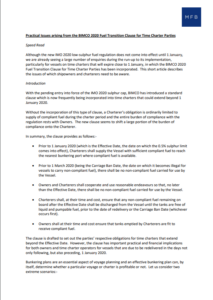Asad Naqvi and Kevin Cooper are partners at MFB Solicitor discuss BIMCO’s 2020 Fuel Transition Clause for Time Charter Parties, highlighting what the shipowners and charterers should focus on amid the upcoming 2020 sulphur cap and fuel switches.
Specifically, without following this clause, a Charterer is obliged to limit the supply of compliant fuel during the charter period and the entire burden of compliance with the regulation rests with Owners. The new clause seems to shift a large portion of the burden of compliance onto the Charterer.
The Clause provides that
- Prior to 1 January 2020: Charterers shall supply the Vessel with sufficient compliant fuel to reach the nearest bunkering port where compliant fuel is available.
- Prior to 1 March 2020, being the Carriage Ban Date, the date on which it becomes illegal for vessels to carry non-compliant fuel: there shall be no non-compliant fuel carried for use by the Vessel.
- Owners and Charterers shall cooperate and use reasonable endeavours so that, no later than the Effective Date, there shall be no non-compliant fuel carried for use by the Vessel.
- Charterers shall, at their time and cost, ensure that any non-compliant fuel remaining on board after the Effective Date shall be discharged from the Vessel until the tanks are free of liquid and pumpable fuel, prior to the date of redelivery or the Carriage Ban Date (whichever occurs first).
- Owners shall at their time and cost ensure that tanks emptied by Charterers are fit to receive compliant fuel.
Analyzing the challenges arising from the Clause, the law firm discusses two possible scenarios:
- Redelivery takes place on 31 December 2019
- Redelivery takes place on 2 January 2020
# Concerning scenario a / Redelivery on 31 December 2019:
If the vessel is conducting its final voyage before the redelivery, it is possible that it will not have compliant fuel onboard, and potentially the tanks will be either cleaned or not to store ultra low Sulphur fuel.
The BIMCO Clause does not expressly deal with charter parties ending prior to the Effective Date so, on a strict reading, it could be argued that the operation of the clause is only triggered if redelivery is to occur after the Effective Date, as the MFB comments.
Although it is not mandatory for both parties to conduct reasonable endeavours to ensure that there is no non-compliant fuel on board after 1 January, whether a Charterer who is going to redeliver on 31 December must supply ULSFO sufficient to reach the next bunkering port is not at all clear.
Therefore, the lack of clarity may result to challenges for both parties, either for the charterer or for the owner.
For an Owner:
- He may be required to pay for High Sulphur Fuel Oil (“HSFO”) on redelivery at the agreed price, only to have to discharge that fuel the day after (at a much lower price), in his time.
- He may be left with his vessel full of HSFO, which the next charterer will not accept until it is replaced with ULSFO.
For a Charterer:
- Is he required to supply any ULSFO if he plans to redeliver prior to the Effective Date? If so, must he do so even if he is redelivering on 20 December? Or on 10 December?
- If he does supply ULSFO prior to redelivery, he may only receive payment in accordance with the lower charter party HSFO price, having paid a substantial premium for ULSFO.
# Concerning scenario b / Redelivery on 2 January 2020
Under the possibility that a time charter unexpectedly runs over by a few days, the charterer’s obligations increase, as the obligations set by BIMCO’s clause are triggered.
Overall, Asad Naqvi and Kevin Cooper recommend that owners may want to think of letting their vessel to a charter that requires redelivery after the Effective Date, so that their burden is lessened.
To explore more on MFB’s recommendation click herebelow































































